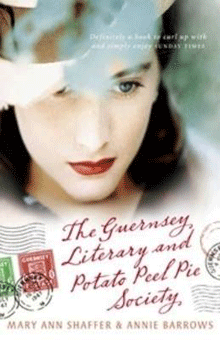Review of The Guernsey Literary and Potato Peel Pie Society by Mary Ann Shaffer

There have not been many books this year which have made me laugh out loud. The curiously named The Guernsey Literary and Potato Peel Pie Society made me guffaw several times ☺
What a delightful book! It is written as a series of letters to and from the feisty Juliet Ashton, a writer who has gained fame with her satirical column in a London newspaper during the Second World War.
Juliet is successful and single, and one of the sub-plots is the efforts of many to help Juliet find her match. However the book also has a serious side, chronicling the invasion of Guernsey Island by the German army during WW2. I never realised that part of England was occupied during the war, and the reminiscing of the characters (based on research by the author) made for some sobering reading.
Very cleverly, the core of the book is actually another character, Elizabeth McKenna: a wonderful, intelligent, compassionate resident of Guernsey, who touches the lives of everyone she meets. Elizabeth holds the correspondence together by her presence, and her absence.
The Guernsey Literary and Potato Peel Pie Society was formed as an excuse to save the lives of several friends on the island who had gathered after curfew for a sumptuous meal, roasted illegal pork! The Germans had taken possession of all the pigs, but the islanders ingeniously managed to raise a pig, and the generous Amelia Maugery invited some friends around to enjoy the roast dinner, a truly significant event at a time of severe deprivation.
However, the dinner guests were caught on the way home. It was the quick-thinking and courageous Elizabeth who thought up a reading group as an excuse for the gathering. To keep up the pretence, Amelia arranged the collection of books, and many of the society were forced to take up reading "proper books" for the first time. The results were life-enhancing, as well as amusing and heart-touching.
The potato peel pie link, you will have to discover for yourself, but it is an indication of the gentle comedy vein that runs rich through the novel.
The author, Mary Ann Shaffer, was a former librarian and bookseller, and a love of reading, as well as the transformational nature of the written word, are prevalent themes. This is exemplified in the following quote:
I like stories of passionate encounters. I myself have never had one, but now I can picture one. I didn't like Wuthering Heights at first, but the minute that spectre Cathy scratched her bony fingers on the windowpane - I was grasped by the throat and not let go… I don't believe that after reading such a fine writer as Emily Brontë, I will be happy to read again Miss Amanda Gillyflower's Ill-Used by Candlelight. Reading good books ruins you for enjoying bad books.
This novel is full of quirky characters with their wise observations of life, and is artfully arranged.
My only disappointment is that the one character identified as a Christian is a wowser and joy killer. It is a pity such a stereotype dominates literature when Jesus is a compassionate, gracious, life-abundant force. Elizabeth McKenna is much closer to a Jesus figure.
That aside, as a first novel it is a triumph. What a pity therefore that it is also Shaffer's last. She passed away in the final stages of editing, and the book was completed by her niece Annie Barrows.
I echo the many reviewers who have written: "This is a novel I want everyone to read."




























